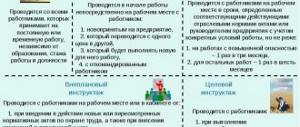Carrying out work activities at the enterprise is associated with compliance by all employees with internal regulations, fulfillment of work standards, duties in accordance with current legislation and the employment contract concluded with the company’s management.
Labor discipline, the definition of which will be presented below, is extremely important because it does not allow individual citizens, or the work collective as a whole, to create obstacles to the performance of work activities by each employee.
Responsibilities of employees and labor discipline
General responsibilities of employees are determined by the Labor Code and include:
- fulfillment of assigned duties
- compliance with internal labor regulations
- compliance with labor protection requirements
- careful attitude of the employee towards the property of employees and the enterprise
In addition, each employee must qualitatively and conscientiously perform professional duties defined by the contract, regulations and job descriptions.
Labor responsibilities are specified in the employment contract and additional agreements thereto. As well as internal labor regulations, collective labor agreements, and regulations on bonuses for employees. An employee can be required to comply with labor discipline and perform assigned duties only if the employee is familiar with the relevant document against signature.
The concept of labor discipline
What is work discipline?
According to Art. 189 of the Labor Code of the Russian Federation, labor discipline refers to the obligations of all employees of the organization to follow certain rules of behavior in the framework of their assigned work tasks.
The limits beyond which it is considered impermissible for an employee to go beyond are contained in the mentioned code, local acts of the enterprise, and an employment contract.
Labor discipline is defined as employee behavior that complies with legal norms, employment contracts and management orders that do not conflict with the above documents.
Depending on the degree of compliance with regulations and rules, there are:
- increased level of discipline;
- reduced level of discipline;
- insufficient level of discipline;
- standard (normal level of discipline).
When carrying out labor activities, employees must also observe production and technological discipline. Labor discipline is part of them; it is necessary to protect the enterprise from operational failures associated with the lack of raw materials, labor, necessary tools and materials.
The employer is responsible for compliance with production discipline; the responsibility of employees extends only to violations in the field of labor.
So, if an employee is obliged to report to the workplace (enterprise entrance) no later than 8.00, then his absence can be regarded as a violation of labor discipline.
Violation of labor discipline standards also includes an employee’s unauthorized departure from the workplace, a long lunch break, or untimely notification of management about incidents that have occurred if they caused the shutdown of a particular machine and the entire workshop.
At the same time, the employee cannot be held responsible for the enterprise’s lack of opportunities to purchase new equipment and prevent breakdowns of existing equipment.
Employees of the organization must be provided with the materials and tools they need, otherwise they will not be able to begin their work activities.
Technological discipline, in turn, assumes that if an employee has all the technological means of production necessary for an employee, he will adhere to the rules established in the organization.
Legal regulation
It is important to maintain work discipline.
The Labor Code of the Russian Federation, the Federal Law of the Russian Federation, as well as the employment contract concluded with the employer oblige employees of a particular enterprise to observe labor discipline.
Employees who violate established standards and regulations bear disciplinary liability for their actions. As a legal category, labor discipline presupposes mutual responsibility of both the employee and the employer.
In Art. 21 of the Labor Code of the Russian Federation indicates the need:
- Follow the labor responsibilities established by the employment contract;
- Compliance by employees with labor standards and regulations;
- Adhere to safety regulations;
- Showing care for the employer's property.
By presenting certain requirements for labor discipline, the employer is obliged to create appropriate conditions for employees.
Employees of the enterprise who do not comply with the labor regulations, who allow themselves to be negligent in their work and discipline, may be subject to disciplinary action. In turn, employees who observe labor discipline and take a responsible approach to fulfilling their assigned duties can be rewarded.
Encouragement and disciplinary action are a legal form of maintaining labor discipline at an enterprise.
All employees must understand that no offense goes unpunished and, conversely, no good deed goes unnoticed.
Responsibilities of employers aimed at ensuring labor discipline
The employer also has a certain range of responsibilities for ensuring labor discipline:
- creating conditions for the employee to perform job duties
- ensuring labor protection
- supply of necessary equipment and tools
- providing equal opportunities for remuneration of employees
- full and timely payment of wages
- encouragement for conscientious performance of labor duties and punishment for their violation
- compulsory social insurance for all employees
- compensation for damage caused during the performance of duties by an employee
One of the mandatory local acts is the Internal Labor Regulations. They are approved by the employer, but the provisions of the Rules must not contradict the mandatory requirements and rules.
Material liability
Despite the ban on applying fines for violation of labor discipline in general, the employee who caused harm may be held liable in monetary terms. Art. speaks about this. 238 of the Labor Code of the Russian Federation: he is obliged to compensate for material damage, to compensate for the direct decrease in values, property or deterioration of its properties. Estimated income and the amount of lost profits are not taken into account. The amount is limited to the perpetrator’s monthly earnings.
Head, according to the text of Art. 277 of the Labor Code of the Russian Federation, is financially responsible for direct damage to the organization in full. Amounts are calculated based on the Civil Code of the Russian Federation. The chief accountant is responsible on a general basis, in the amount of monthly earnings. Full liability can be stipulated in an employment contract, but since the law does not contain clear grounds for full recovery, such an agreement can be challenged by going to court.
A full liability agreement may be concluded between the team, brigade and employer, as stated in Art. 145 TK. It is appropriate if it is impossible to determine individual guilt for property damage. Within the team, the issue of personal responsibility of each is resolved, and the employer is compensated for the full amount. Each person signing such an agreement must be an adult.
There is a list of positions established by Resolution of the Ministry of Labor No. 85, for which 100% financial responsibility is provided:
- cashiers (employees with cashier functions);
- workers dealing with banknotes, securities, bank cards, precious metals, etc.;
- warehouse workers, forwarders, pawnshop employees, storage lockers, suppliers, etc.;
- pharmacy staff and senior nurses;
- workers in public catering and public services, hotel business;
- construction workers with access to building materials;
- library workers, laboratory assistants, methodologists, department staff.
An agreement on full personal financial responsibility is signed only with an adult employee.
Encouragement as a method of ensuring labor discipline
Labor legislation defines two main methods of ensuring discipline: encouragement and punishment.
Encouragement is public recognition of an employee’s professional merits, the provision of public honor, and awards. This method can be applied both to an individual employee and to the work team as a whole.
For conscientious performance of duties, the Labor Code of the Russian Federation provides for the following types of incentives:
- bonuses
- announcement of gratitude
- awarding a certificate of honor
- rewarding with a valuable gift
- nomination for the title of best in profession
Other types of incentives may be provided for by internal regulations, collective agreements, enterprise charters and other regulations.
For special labor services to the state, an employee may be nominated for a state award. An entry about employee incentives is made in the work book.
WHY EXECUTIVE DISCIPLINE IS ANALYZED IN FEBRUARY
It will be possible to analyze the execution of tasks in the organization over the past year no earlier than February. An annual certificate of performance discipline in an organization is prepared in the first days of February for two reasons :
- Most document tasks have a typical deadline of 30 calendar days. If the task is given on December 30, then it must be completed before January 30 inclusive. In 2021, the last working day was December 29 (January 29, 2021 is the typical deadline for completing tasks according to documents). In 2021, December 30 and 31 will already be working days, therefore, the deadlines for completing tasks will shift to the last days of January.
- It is impossible not to take into account the human factor and the very common habit of postponing things until the last minute. It is unlikely that among the performers there will not be someone who will send their reports on January 29, although he had a whole month to do this.
Thus, if the assignment deadline is January 29, then we must wait until that day. If there is no completion report even on January 30, only then can the task be considered as unfulfilled.
Violation of labor discipline
An employee often faces violations of his labor rights, mainly in non-state owned organizations. The most common of them are: the use of unauthorized penalties, illegal dismissals of employees, non-payment or partial payment of wages, payment to employees of amounts that do not correspond to accounting documents, failure to provide regular vacations or provision without pay, non-payment of benefits for temporary disability, and so on.
An example of such a violation is the arbitrary imposition of penalties on an employee by an employer at a time when the regulatory acts of the enterprise do not provide for such an impact.
Increasing the level of discipline
Executive discipline or performance is characterized by four main indicators:
- Quality of work.
- Efficiency.
- Timeliness.
- Productivity.
These indicators can be improved if you pay special attention to certain points. Firstly, before hiring an employee, you need to make sure of his level of qualifications and work experience. It is worth carefully studying the candidate’s personal characteristics and past work experience. Some corporate owners are of the opinion that it is better to hire a person “without experience” because it is much easier to teach than to retrain. When hiring employees, all factors must be taken into account.
Secondly, it is necessary to establish a structure within the organization:
- Discipline. Of course, we are not talking about devoting a few minutes of time to personal hygiene and monitoring it down to the seconds. But there must be discipline. Familiarity in a team is, on the one hand, good, but on the other hand, the company may suffer from it. Therefore, the disciplinary procedure should be the same for everyone, and penalties should be imposed for failure to comply with the established rules.
- Versatility. Each project has its own characteristics and nuances, so experts recommend creating several groups of employees in the company. Some will carry out projects in accordance with universal quality requirements, and the other group will customize this project to the personal requirements of the customer.
- Qualification. Employees must develop. After all, the more experienced the employee, the higher the level of executive discipline, and, accordingly, the company’s profit.
Requirements for the procedure for registering a violation
In order for the punishment to have legal force and not be contested by the employee (especially in the case of dismissal), it is necessary to comply with a number of requirements for the timing and procedure for processing documents related to the violation:
- The fact that the employee is familiar with the rules of labor discipline must be documented.
- There must be clear guilt of the employee in the identified violation.
- The fact of a violation must be documented immediately upon detection.
- Before a decision is made to impose a penalty, the employee must be given the opportunity to justify himself in writing. If he refused to do this, then it is necessary to draw up an act of refusal to provide explanations. The employee is given 2 working days to explain.
Read about the nuances of drawing up an act on the employee’s refusal to provide explanations in the article “How to draw up an act on refusal to write an explanatory note?”
- The decision on penalties can be made no later than 1 month from the date of discovery of the misconduct and no later than 6 months (and in relation to financial violations - 2 years) from the date of its commission, taking into account the fact that this time does not include periods during which the employee can be absent from work (Article 193 of the Labor Code of the Russian Federation).
- The order to punish the employee must be familiarized with a signature no later than 3 working days, and if he refuses to sign it, then this fact must be reflected in the act.
Any of the violations committed in the procedure for issuing a punishment may lead to its recognition as being imposed illegally.
WHAT IS CONTROLLED
If an organization uses an electronic document management system (EDMS), then all tasks assigned in it automatically fall under control. Daily and annual certificates are also generated automatically (detailed). The person responsible for control remains to generate a report and “unload” it from the program.
In the absence of an EDS, there are options:
- the organization can control all tasks. On the one hand, this simplifies the process: you do not need to make a decision regarding each task whether to control its execution or not. On the other hand, the amount of work increases significantly. What the EDMS does automatically, the person in charge is forced to do manually;
- The organization determines the tasks that are put under control. A list of respondents is compiled, the execution of letters from which is monitored; topics of internal and external correspondence; types of documents. The list is fixed in the instructions for office work (Example 3). Pay attention to clause 5.8.27 in Example 3: it gives the organization the right to put any order under control if the director considers it necessary.
CERTIFICATE ABOUT EXECUTIVE DISCIPLINE
The result of constant monitoring of the execution of the manager’s tasks is certificates of performance discipline. According to the decision of management, certificates can be of different frequency: from daily to annual. The principle is simple: if an organization practices monthly bonuses based on performance, then a certificate is drawn up monthly; If the bonuses are quarterly, then the certificate is quarterly. You can generate reports more frequently to identify uncompleted tasks in a timely manner. The annual report is drawn up in any case: every manager wants to know how many of the tasks assigned to him during the year were completed (Example 7).
The form of the certificate is also developed at the organizational level and is recorded in the office management instructions.
Leave a comment on the document
Do you think the document is incorrect? Leave a comment and we will correct the shortcomings. Without a comment, the rating will not be taken into account!
Thank you, your rating has been taken into account. The quality of documents will increase from your activity.
| Here you can leave a comment on the document “Regulations on Labor Discipline”, as well as ask questions associated with it. If you would like to leave a comment with a rating , then you need to rate the document at the top of the page Reply for |
How can I remove a charge?
Penalties imposed in the form of a reprimand or reprimand can be lifted in one of two ways (Article 194 of the Labor Code of the Russian Federation):
- The penalty is lifted automatically without special decisions when its validity period expires (1 year from the date of issuance), if no new violations have occurred during this period.
- Before the expiration of 1 year, if there is someone’s initiative supported by a management decision. The initiative can be taken by the employee himself, his immediate superior or the work team.
A note about the removal of a penalty, as well as about its imposition, is entered in the employee’s personal card.
For information about what other personnel documents need to be completed for each employee, read the material “Personnel documents that must be in the organization.”






